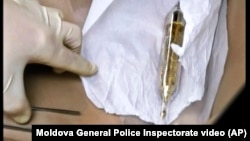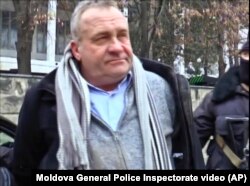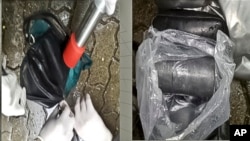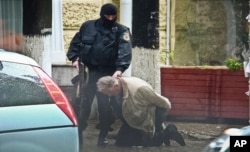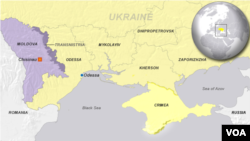Eastern European gangs have tried to sell radioactive materials to Middle Eastern extremists, including Islamic State, The Associated Press reported Wednesday.
Four attempted sales by gangs with suspected Russian connections have been thwarted in the past five years by authorities in the eastern European country of Moldova working with the FBI.
AP reports that the last attempt was in February, when a smuggler in the Moldovan capital, Chisinau, offered a large cache of deadly cesium and was specifically looking for a buyer from IS.
“You can make a dirty bomb, which would be perfect for the Islamic State,” the smuggler, Valentin Grossu, told an informant at a dance club and sushi bar. “If you have a connection with them, the business will go smoothly.”
AP reports Grossu was asking for $2.8 million (2.5 million euros) in exchange for the cesium, which is capable of contaminating several city blocks.
It took about 20 meetings for the informant to convince Grossu he was IS and make the exchange of cash for the small sample of cesium that landed Grossu in jail.
“We applaud the Moldovan government’s good police and investigative work, which led to recovering the smuggled materials and placing them back under regulatory control,” U.S. State Department spokesman John Kirby said Wednesday, adding that the smuggling of nuclear materials is something the U.S. government takes very seriously.
More cases expected
AP was given access to Moldovan investigative case files in order to demonstrate how serious the problem of nuclear smuggling is in the impoverished former Soviet bloc country.
Moldovan authorities said the breakdown in cooperation between the West and Russia has made the job of tracking Russia’s vast store of radioactive materials much more difficult. No one knows how much has filtered into the black market.
“We can expect more of these cases,” Moldovan police officer Constantin Malic told AP. “As long as the smugglers think they can make big money without getting caught, they will keep doing it.”
Malic and the other Moldovan investigators were on a short learning curve, going from near ignorance of nuclear smuggling to closing four cases in five years by penetrating smuggling networks posing as gangsters. The FBI helped by providing high tech gear such as radiation detectors and clothing threaded with recording devices.
At times, Malic calmed his nerves with shots of vodka before going undercover.
The most serious of the four cases began in the spring of 2011, when the investigators infiltrated a group led by a shadowy Russian named Alexandr Agheenco and known as the "Colonel." Moldovan authorities believe him to be an officer with the Russian Federal Security Service [FSB], formerly the KGB.
AP reports that a middle man working for the Colonel was recorded arranging the sale of the bomb grade uranium, U-235, and blueprints for a dirty bomb to a man from Sudan. “He said to the informant, ‘I really want an Islamic buyer because they will bomb the Americans,’” Malic told AP.
The blueprints were discovered in a raid of the middleman’s home, according to police and court documents. But Agheenco got away and, police say, may have more nuclear material to sell.
AP reports that most of the arrests were made after cash was exchanged for samples. There were strategic reasons for this, but the results were that kingpins got away and those arrested were able to evade long prison sentences and return to nuclear smuggling.
And the bulk of the nuclear material being marketed is still out there.
The State Department’s Kirby said, “The proliferation, the smuggling, the movement of this material has grave consequences if not stopped, and if not hindered, and we’re going to continue to work across, not just the U.S. government, but internationally as this demonstrated.”




